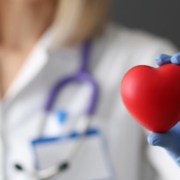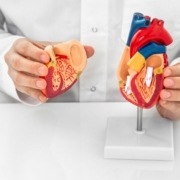Are These Symptoms Warning Signs of Heart Disease?
On average, about 805,000 Americans have a heart attack each year. Of these, nearly one-quarter have already had one heart attack and the rest have a heart attack for the first time. Heart attacks kill nearly 647,000 people each year. This means every 40 seconds, one American dies from heart disease, making it the number one cause of death in the United States. Overall, every one out of four deaths is due to heart disease. Of the people who survive, they all say they wished they were more aware of warning signs of heart disease.

What is a heart attack?
A heart attack, also known as a myocardial infarction, occurs when parts of the heart muscle do not get adequate blood supply. The most common reason why blood cannot get to the heart muscle is because of atherosclerosis of the blood vessels that supply the heart muscle. When these coronary vessels are narrowed or blocked, the heart does not get oxygen and, consequently, a heart attack occurs. The earlier that blood flow is restored to the heart muscle, the better the outcome. If treatment is delayed, one can die or develop a number of complications, such as an abnormal heartbeat, weakness, no exercise endurance, or heart failure. Today, almost every hospital has a team of cardiologists who cater specifically to people with chest pain related to heart problems. The earlier that treatment can be provided, the better the chances of a successful outcome for the patient.
Hence, it is very important that all adult Americans know the early warning signs of heart disease and seek immediate medical care.
What are the early warning symptoms of a heart attack?
- Chest discomfort or pain. The majority of heart attacks will present with chest pain, which is usually located around the left chest area. The pain may be crushing, squeezing, burning, or a dull ache. It may come on gradually after some type of physical activity, but it can also occur at rest. The duration of the pain may last several minutes but if no treatment is administered, the pain can come back again and last several hours.
- The chest pain may radiate to the neck, jaw, or left arm. This feature is more common in women than men.
- Shortness of breath. A significant number of people who develop a heart attack may notice that they are out of breath. They may need to rest to prevent worsening of the shortness of breath. Even speaking can be difficult when shortness of breath is severe.
- Feeling faint and lightheaded. Most people who develop a heart attack will feel faint and immediately sit down to avoid falling. This feeling may last a few minutes.
- Sweating. Is excessive sweating a sign of heart disease? Men are more likely than women to break out in a sweat. The sweating may come on at the same time as the chest pain and can be profuse. Sweating alone may not be a specific symptom of a heart attack, but if it occurs in association with chest pain, then the diagnosis is more likely.
- Almost all individuals who are developing a heart attack will feel tired or have no energy. You may feel like just resting or sleeping.
Other symptoms of heart attacks
Nausea is also a symptom that can occur in people having a heart attack. Nausea can be mild to moderate and, in rare cases, may also be associated with a bout of vomiting. In general, the typical signs of a heart attack include chest pain, shortness of breath, general malaise, fatigue, and diaphoresis. Women are more likely to have atypical symptoms, such as nausea, pain in the arm or neck, or feelings of lightheadedness.
Seek help immediately
If you develop any of the above symptoms, it is important to consider an acute heart attack. Do not drive yourself to the hospital but call 911 ASAP. One of the key mistakes many people make is delaying the trip to the hospital in the hope that everything will be fine. The sooner you get to the emergency department, the faster you can get treatment and hopefully decrease the extent of damage to the heart muscle. Today, almost all hospitals in North America have standard protocols to manage a heart attack. As soon you arrive, testing will be done immediately to determine if you are having a heart attack and the heart doctors will be notified. The treatment for a heart attack is focused on restoring blood flow to your heart.
Reduce the risk of a heart attack
Know the warning signs of heart disease. In many cases, you can reduce your risk of having a heart attack by making the following changes to your lifestyle.
- Do not smoke or discontinue the habit. Unfortunately, there is no magic pill to stop smoking. Going “cold turkey” is perhaps the best and most effective method; it is also the cheapest method. You just need to have the determination to better your health.
- Eat a healthy diet. Your diet should be more plant-based rather than animal-based. In addition, eat fruits, veggies, nuts, whole wheat, and use unsaturated oils. Avoid saturated fats and red meat.
- Limit the amount of alcohol intake. While red wine has some health benefits, most people overdo it and risk liver damage. The health benefits possible from the consumption of red wine can easily be obtained by walking for 30 minutes every day.
- Exercise. Become physically active and this will help you reduce your body weight, lower your blood pressure, cholesterol, and blood sugar. Exercise should be done regularly, and its benefits are sustained into older age.
- Be compliant with your medications. Take them as prescribed to keep your blood pressure, cholesterol, and blood sugar under control.
- Do not skip your appointments with your healthcare provider.
CONCLUSION
Pay attention to your body and the signals it gives you to alert you that something may be wrong. If you listen to the warning signs of heart disease, you will be better prepared to get to a hospital sooner, rather than later, and increase your chances of survival with minimum impacts to your body.
Cano Health is implementing a Healthy Heart Program with help from Dr. Juan Rivera. Dr. Juan is a cardiologist who specializes in early detection and treatment for heart disease. Call today at 855.447.6059 to learn more about everything that Cano Health offers, including the Healthy Heart Program.









